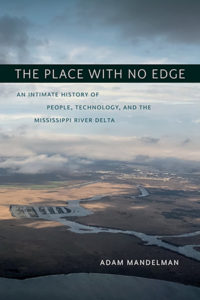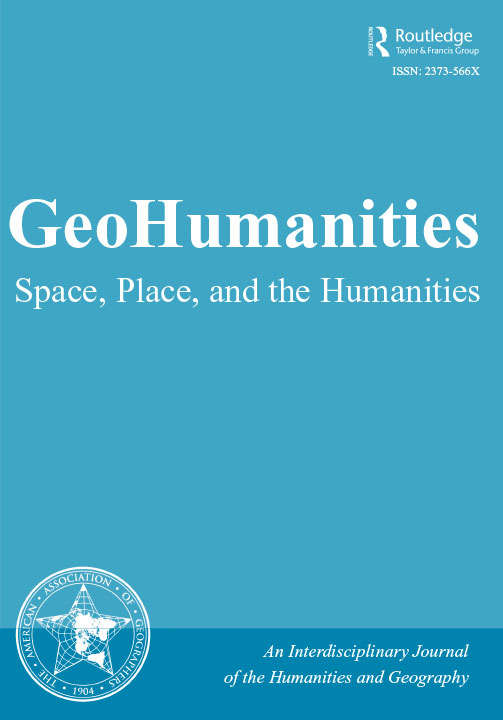AAG Announces 2020 Book Awards
The AAG is pleased to announce the recipients of the three 2020 AAG Book Awards: the John Brinckerhoff Jackson Prize, the AAG Globe Book Award for Public Understanding of Geography, and the AAG Meridian Book Award for Outstanding Scholarly Work in Geography. The AAG Book Awards mark distinguished and outstanding works published by geography authors during the previous year, 2020. The awardees will be formally recognized at a future event when it is safe to do so.
The John Brinckerhoff Jackson Prize
This award encourages and rewards American geographers who write books about the United States which convey the insights of professional geography in language that is both interesting and attractive to lay readers.
 Adam Mandelman, The Place with No Edge: An Intimate History of People, Technology, and the Mississippi River Delta (LSU Press, 2020)
Adam Mandelman, The Place with No Edge: An Intimate History of People, Technology, and the Mississippi River Delta (LSU Press, 2020)
Adam Mandelman’s The Place with No Edge: An Intimate History of People, Technology, and the Mississippi River Delta offers an engagingly written interpretation of one of North America’s most unique cultural landscapes. Probing the environmental history of the lower Mississippi Delta, Mandelman reveals the intimate interplay of people, technology, politics, land, and water in a setting that for centuries has challenged and frustrated Euro-Americans. What he discovers is a rich story of how humans modified the delta environment as sugar cane farmers, rice producers, timber harvesters, oil drillers, and petrochemical manufacturers dramatically transformed the regional landscape. He documents how the technologies they utilized actually brought the Delta’s culturally diverse peoples into more intimate, interdependent relationships with their complex natural setting.
Rejecting the simple argument that this was merely another example of people destroying an environment they did not understand, Mandelman encourages us to appreciate the complexity of that human-land relationship. He argues that people need to look more closely at the interplay of technology and nature and to responsibly intervene in respectful ways where possible.
Mandelman’s nuanced narrative explains why this is so important and he suggests how it is necessary to understand and make sustainable this exotic setting for the people, plants, and animals that call it home. Mandelman’s work is indeed an excellent example of the kind of geographical research and writing recognized by the AAG John Brinckerhoff Jackson Prize.
The AAG Globe Book Award for Public Understanding of Geography
This award is given for a book written or co-authored by a geographer that conveys most powerfully the nature and importance of geography to the non-academic world.

Alison Mountz, The Death of Asylum: Hidden Geographies of the Enforcement Archipelago (Minneapolis: University of Minnesota Press, 2020)
Alison Mountz’s monograph The Death of Asylum: Hidden Geographies of the Enforcement Archipelago is an important, timely and critical intervention in debates over the deadly curtailment of refugee rights globally.
By carefully charting the hidden geographies in which forced migrants are increasingly detained, Mountz provides a clear account of how contemporary states are using territory and off-shore management sites to deny access to asylum. While drawing on sophisticated geographical theories in its analysis of these deadly developments, the book is never intimidating. It is certainly sobering and overwhelming at moments, but by drawing readers in with compelling and sometimes surprising stories it remains at once accessible and alluring. It shows how a wide array of works by other geographers – from scholars of migration and borders to theorists of geopolitics, precarity and spaces of exception – can help us and a wider public come to terms with the practical death of asylum as a human right.
By thereby connecting the fates of real human beings with the construction of spaces where being human is repeatedly denied to the point of death, the book also invites readers to reflect deeply on how their own human geographies are bound up with those of others deemed illegal and unwanted. It is an urgent indictment of our times, but also of the intersecting territories of sovereignty and security in which borders demarcate belonging with such deadly consequence.
The AAG Meridian Book Award for Outstanding Scholarly Work in Geography
This award is given for a book written by a geographer that makes an unusually important contribution to advancing the science and art of geography.

Chie Sakakibara, Whale Snow (University of Arizona Press, 2020)
In Whale Snow, Chie Sakakibara pioneers a vision of surviving humankind and kin safely segueing a conjoined path in the future. On the frontier between tundra and ocean, she engaged in the kind of years-long fieldwork that exemplary geographers have pursued for generations in an effort to understand the why of where. Recognizing that whales and whaling remain integral to Inupiat lifeways, despite the onslaught of globalization and climate change, her work explores and elucidates the significance of bowhead whales to the persistence of Inupiaq culture and community.
This book offers a rare, qualified, and yet substantiated optimism to readers around the world. Hers is a vision of “being in a togetherness” that perseveres against myriad adversities on the near horizon, and that can continue to do so far into the future. This research is exemplary in its
sustained commitment to the community. It demonstrates the best of embedded, ethically-driven, and collaborative knowledge production. Those who seek, through their own studies with diverse cultural communities of practice, to overcome – as do the whaling Inupiat of Alaskan North Slope Borough, in unity with their animal kin — the existential threats of our unprecedented and contingent present will be inspired and transformed by reading this book.
In so many ways, Whale Snow epitomizes the essence of geography as an art, science, method, literary practice, and a way of understanding and relating to the world.

